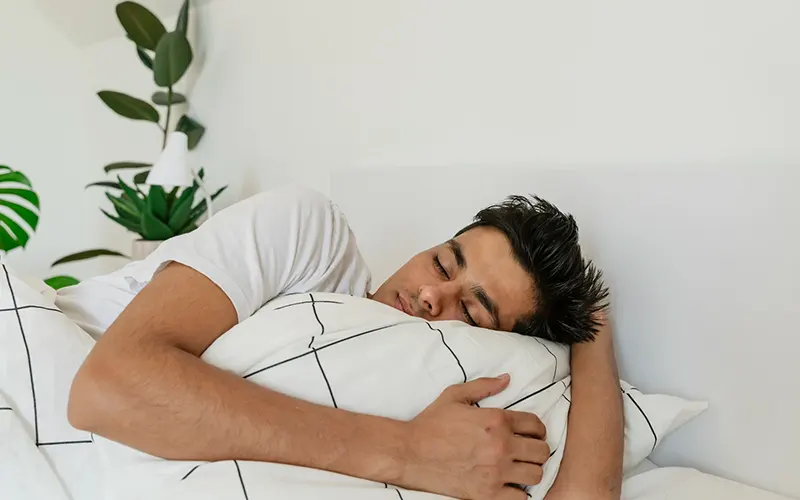A recent review delves into the fundamental disparities between men and women in sleep patterns, circadian rhythms, and metabolic processes.
Published in Sleep Medicine Reviews, the paper underscores the significant influence of biological sex on these aspects and advocates for considering an individual’s sex in the treatment of sleep, circadian rhythm, and metabolic disorders.
Sleep Disparities
The review revealed that women consistently rate their sleep quality lower than men and experience more variability in sleep quality, particularly linked to fluctuations throughout the menstrual cycle. Additionally, women have a 25 to 50 percent higher risk of developing restless legs syndrome and are up to four times more likely to experience sleep-related eating disorders, characterized by recurrent nighttime eating episodes.
Conversely, men are three times more likely to receive a diagnosis of obstructive sleep apnea (OSA). Interestingly, OSA presents differently in women and men, possibly contributing to this discrepancy. Furthermore, OSA is linked to an increased risk of heart failure in women, whereas this association is not observed in men.
Studies conducted in sleep labs have revealed that women spend more time asleep than men, with approximately 8 minutes more spent in non-REM (Rapid Eye Movement) sleep, characterized by decreased brain activity. As individuals age, the duration of non-REM sleep decreases, with a more pronounced decline observed in older men. Women also enter REM sleep, marked by heightened brain activity and vivid dreaming, earlier than men.
Circadian Rhythm Variances
A team of exclusively female researchers from the University of Southampton in the UK, along with counterparts from Stanford University and Harvard University in the United States, discovered sex-based differences in our circadian rhythms.
They observed that melatonin, a hormone crucial for regulating circadian rhythms and sleep, is released earlier in women compared to men. Similarly, core body temperature, which peaks before sleep and drops several hours before waking, exhibits an earlier peak in women than in men.
Consistent with these findings, other studies indicate that women have slightly shorter intrinsic circadian periods compared to men, by approximately six minutes.
Dr. Renske Lok from Stanford University, who led the review, explains: “Although this discrepancy may seem minor, it holds significance. The divergence between the central body clock and the sleep/wake cycle is roughly five times greater in women than in men. Consider the effect of a watch consistently running six minutes fast or slow. Over time, this disparity can lead to a noticeable misalignment between the internal clock and external cues like light and darkness, spanning days, weeks, and months.”
“Imbalances in circadian rhythms have been associated with a range of health issues, encompassing sleep disturbances, mood disorders, and diminished cognitive abilities. Even subtle variations in circadian patterns can exert substantial effects on one’s overall health and quality of life.”
Men typically exhibit later chronotypes, displaying a preference for going to bed and waking up later than women. This tendency may result in social jet lag, where their circadian rhythm conflicts with societal expectations, such as work schedules. Additionally, men generally maintain less consistent patterns of rest and activity throughout the day compared to women.
Metabolic Effects
The research team also explored the potential link between the global rise in obesity and insufficient sleep, noting that 30 percent of individuals aged 30 to 64 sleep less than six hours per night in the United States, with similar figures observed in Europe.
Notably, significant disparities emerged in how the brains of women and men responded to food images following sleep deprivation. Women exhibited double the brain activity in networks associated with cognitive (decision-making) and affective (emotional) processes compared to men. Moreover, a separate study revealed that women displayed 1.5 times higher activation in the limbic region—an area involved in emotion processing, memory formation, and behavioral regulation—in response to images of sweet food, compared to men.
Despite these variations in brain activity, men tend to consume more calories than women in response to sleep deprivation. Another study indicated that fragmented sleep, prolonged sleep onset, and increased time spent attempting to sleep were only linked to heightened hunger in men.
Both male and female nightshift workers face an elevated risk of developing type 2 diabetes, although this risk is more pronounced in men. Sixty-six percent of female nightshift workers reported experiencing emotional eating, and research suggests they are approximately 1.5 times more likely to be overweight or obese compared to their counterparts working day shifts.
The researchers also uncovered emerging evidence regarding the differing responses of women and men to treatments for sleep and circadian disorders. For instance, weight loss appeared to be more effective in treating obstructive sleep apnea (OSA) in women than in men, while women prescribed zolpidem—an insomnia medication—may require a lower dosage than men to prevent residual sleepiness the following morning.
Dr. Chellappa remarked, “The field of sleep and circadian interventions is relatively new, with limited research on sex differences. As we gain a deeper understanding of how sleep, circadian rhythms, and metabolism vary between women and men, we can progress toward more precise and personalized healthcare, thereby increasing the likelihood of favorable outcomes.”
The study, titled “Sex differences in sleep, circadian rhythms, and metabolism: Implications for precision medicine,” has been published in Sleep Medicine Reviews and is accessible online.
Funding for the research was provided by the Alexander Von Humboldt Foundation, the US Department of Defense, and the National Institutes of Health.
Read More : A good night’s sleep starts with a healthy day










